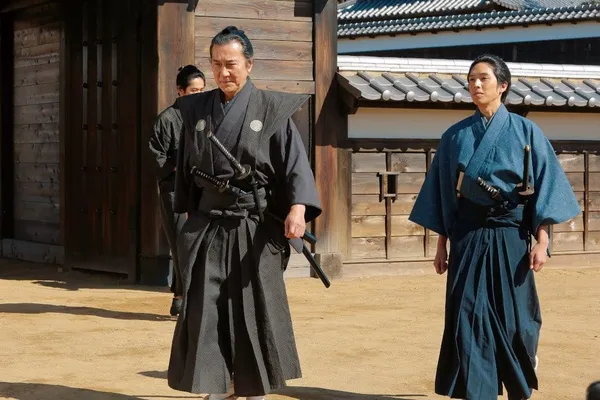Eye For Film >> Movies >> The Pass: Last Days Of The Samurai (2020) Film Review
The Pass: Last Days Of The Samurai
Reviewed by: Jennie Kermode

What did it mean to be a Samurai? The notion of a strict bushido code has long been popular in the West, but in fact, though many people adhered to it strictly, the code itself changed a good deal over the centuries. By the dawn of the Meiji era in 1868, all Japan’s traditions were facing a crisis due to the influence of new ideas spreading from the West. As the country began to tear itself apart during the Boshin war, it was simultaneously caught in a conflict over whether to modernise or once again expel foreigners and defend the standards of the past. Sides taken in the latter conflict did not align neatly with the former.
As the country divided itself into Eastern and Western armies – the Tokugawa shogunate and the restored imperial forces – the Echigo region was caught in the middle, its people either doomed or the last hope for a peaceful national reunification. Most prominent amongst them was Nagaoka lord Tsuginosuke Kawai, who had his own very particular ideas about his duties as a Samurai, and it is his story which this film sets out to tell. Those hoping for battle scenes will not be disappointed, but it is, overall, a film about the importance of peace, and about service – not just to a daimyo, but to all of one’s people.
Although he doesn’t look much like the real Kawai, Kôji Yakusho is perfectly cast in the lead, not only conveying the dignity and integrity which historical record associate with the man, but also giving him a general likeability which is important to keeping viewers with him in scenes where he abases himself in a desperate attempt to get the two warring sides to consider peace. It will be difficult for non-Japanese audiences to understand quite how shocking and humiliating their behaviour is for a man in his position, or how revolutionary the approach it represents, but an earlier scene in which he deals with a band of would-be assassins by having a firm talk with them helps to illustrate the power behind it.
Traditionally, Nagaoka was allied with the Tokugawa shogunate, and Kawai clearly feels the pull of his obligations to it, but like the young emperor, he is heavily influenced by foreign ideas. In particular, he admires Switzerland and its neutral geopolitical stance. The acquisition of a Gatling gun persuades him that he may be able to protect his people by fortifying the Enoki pass, thereby keeping them from having to pick a side. His cosmopolitan interests also enable the acquisition of a music box, a gift for his beloved wife Suga (Takako Matsu). The two actors have wonderful chemistry and their scenes together, depicting a relationship which would make equal sense in the modern world, make the destruction which follows, and Kawai’s persistence against staggering odds, much more meaningful.
Given its focus on intimacy and diplomacy, and the small number of troops at Kawai’s disposal this film is shot on a much smaller scale than most Japanese historical cinema, but it is no less atmospheric as a result, with cinematographers Hiroyuki Kitazawa and Shôji Ueda making excellent use of landscape. Director Takashi Koizumi himself worked as an assistant director on Akira Kurosawa’s Ran, and there is an echo of that here, both visually and in the character of Kawai. Though history remembers him kindly, there are moments when one wonders at the Lear-like fixity and audacity of his vision, and one can imagine how it might have seemed to men in power at the time. He often comes across like a man from the future struggling to fully connect with the age in which he finds himself, a situation perceptibly close to madness.
Not a full biopic, the film centres on events leading up to and surrounding the conflicts at Nagaoka Castle, filling in essential detail about events before and after with narration which, again, it manages to make personal. This means that those who know more about the history involved to begin with will relate to parts of the film differently – a conversation which Kawai has with a field doctor about his leg wound strikes a particularly poignant note – but it is nonetheless accessible to newcomers, and the multi-layered leading performances provide plenty to get to grips with. This focus on small events across a short span of time brings a pleasing specificity to what is also a story about the end of an era and the sociological changes which allowed Japan to move into the modern age. As a swansong from the Samurai tradition, it was a neat fit for the Fantasia international Film Festival, and it brings the bushido code right up to date.
Reviewed on: 02 Aug 2022















